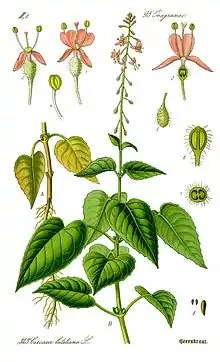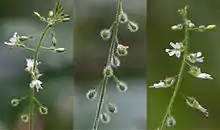Circaea lutetiana
Circaea lutetiana, known as broad-leaved enchanter's nightshade,[1] is a plant in the evening primrose family, Onagraceae.
| Circaea lutetiana | |
|---|---|
 | |
| Botanical illustration from Flora von Deutschland Österreich und der Schweiz (1885) | |
| Scientific classification | |
| Kingdom: | Plantae |
| Clade: | Tracheophytes |
| Clade: | Angiosperms |
| Clade: | Eudicots |
| Clade: | Rosids |
| Order: | Myrtales |
| Family: | Onagraceae |
| Genus: | Circaea |
| Species: | C. lutetiana |
| Binomial name | |
| Circaea lutetiana | |
| Synonyms | |
| |
The genus name comes from the enchantress Circe of Greek mythology and the specific designation is derived from Lutetia, the Latin name for Paris, which was sometimes referred to as the "Witch City". Despite its name it is not especially toxic, but contains a lot of the astringent tannin.[2]
Description

Circaea lutetiana is a perennial herbaceous plant with opposite, simple leaves, on slender, green stems. The flowers are white, borne in summer. It grows 20 cm to 60 cm, rarely up to 75 centimeters high.[3]
The leaves are rounded or slightly notched at the base, they narrow gradually to the pointed tip and are not strongly toothed, but have sinuate edges. The leaf stalks are equally hairy all round.[4]
The flower has 2 notched petals, 2 stamens and a 2-lobed stigma. The open flowers are well spaced along the stalk and there are no bracts at base of individual flower stalks. The fruit consists of 2 equal cells, and usually sets seed. The flower stalks become angled downwards before fruiting.[5] The fruit is a small bur 3.5-5mm[6] which aids the plant's dispersal via zoochory.
In winter the aerial parts die off leaving an underground rhizome.
Circaea alpina will hybridize with Circaea lutetiana producing sterile offspring that persists in vegetative colonies.[6]
Distribution
The plant is native to Europe, Middle Asia, and Siberia.[7] North American populations are now considered to be a separate species, Circaea canadensis. It grows in woods in deep shade and moist environments on nitrogen-containing clay.
Gardening
It is only rarely used as a garden plant. When it is, it is typically of a variety known as 'Caveat Emptor', which has leaves that are heavily mottled pink.
Uses
Circaea lutetiana herb has been used in the traditional Austrian medicine internally as tea, or externally as cold maceration in ethanol, for treatment of rheumatism, gout, infections, and fever.
References
- "BSBI List 2007". Botanical Society of Britain and Ireland. Archived from the original (xls) on 2015-01-25. Retrieved 2014-10-17.
- Alchemy Works Accessed April 2014
- Natural England. Archived 2011-08-10 at the Wayback Machine Accessed July 2011
- English Country Garden Accessed July 2011
- Plant Identification UK Accessed July 2011
- Rhoads, Ann; Block, Tim (5 September 2007). The Plants of Pennsylvania (2nd ed.). ISBN 978-0-8122-4003-0.
- "Plants Profile for Circaea lutetiana (broadleaf enchanter's nightshade)". plants.usda.gov. Retrieved 2016-06-26.